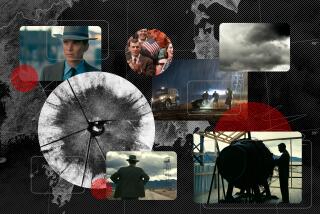TV Reviews : The Historic Turnaround of Postwar Japan
- Share via
The opening scenes of “Power Without a Purpose,” the last installment of the PBS series “Power in the Pacific,” are jolting. Old TV footage shows poor, postwar Japanese workers crushing tin cans to make toy-car bodies for export. The American announcer lauds the vanquished foe for turning “waste into wealth.” Cut to Los Angeles, 1990. Ships bearing 1,200 new Japanese cars arrive daily. This time, the TV announcer has a different message: “Detroit reels.”
That scene powerfully captures the main point of the documentary, which airs tonight at 10 on Channels 28, 15 and 24. Over the past 45 years, war-torn Japan has become the world’s largest creditor nation, while the United States has become the biggest debtor. During the last decade, Americans embarked on a massive military expansion, while Japan perfected its magnificent export machine and amassed national wealth.
The documentary offers a solid, if familiar look at the the issues raised by Japan’s economic power. Is the Japanese buying binge of Rockefeller Center, Columbia Pictures and other U.S. real assets good or bad? Do Japanese manufacturing facilities in America ultimately harm or hurt U.S. interests? Do the Japanese unfairly close their markets and boardrooms to foreigners?
Some of the sequences miss the mark.
To suggest that Japanese influence is beginning to outstrip the Americans’ in the Philippines because of opposition to U.S. military bases and support of Japanese investment is overdrawn. Indeed, a closer examination of the decidedly ambivalent attitudes of other Asians toward Japan would have been revealing. It also would have been more revealing to interview Japan’s corporate captains who built the national wealth to find out how they want to use it. Instead, the program relied on the familiar figures of Makoto Kuroda and Taizo Watanabe, two bureaucrats who most often serve as Japan’s voice to the outside world.
The program draws the right conclusion: The United States and Japan must cooperate or face mutual destruction because our economies are so intricately interwoven. But it brings viewers no closer to answering the central question: What larger political role must a nation that is at once an economic giant and military dwarf now play in the world?
More to Read
The complete guide to home viewing
Get Screen Gab for everything about the TV shows and streaming movies everyone’s talking about.
You may occasionally receive promotional content from the Los Angeles Times.







